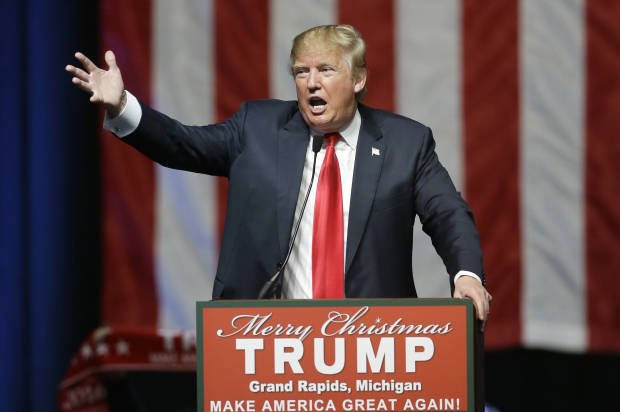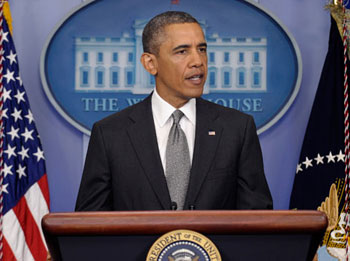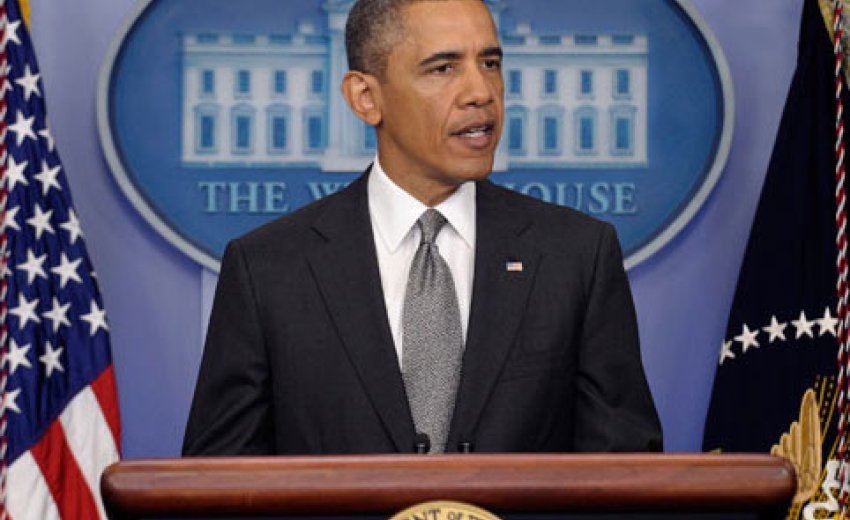Politicians like Trump have emboldened those hostile toward minorities —
we need real leaders to confront it
 |
| In this photo taken Dec. 21, 2015, Republican presidential candidate, businessman Donald Trump addresses supporters at a campaign rall in Grand Rapids, Mich. The former reality television star and tabloid king has relied on free news coverage to power his presidential campaign. And he wants to control that coverage as much as possible. (AP Photo/Carlos Osorio)(Credit: AP) |
Editor's Note: The view expressed in this article are of the author's
Sunday, Jan 3, 2016: This winter, visible religious minorities, especially Sikhs and Muslims, feel a bit like we’re back where we were 14 years ago, in the dark days after 9/11. In recent months, we have seen a surge of hostility around the country that makes many of us feel unsafe and unwelcome in our own country.
Opportunistic politicians like Donald Trump have, unfortunately, made public comments that have only emboldened those who harbor hostility against religious minority communities. Moreover, it’s not just Donald Trump; the entire crop of Republican front-runners seems obsessed with making Democrats utter the words “radical Islam,” as if that phrase would somehow strike a death blow to ISIS. And yet they are not at all concerned about uttering another word that hits much closer to home: Islamophobia.
And yes, even that word, with its “-phobia” suffix, feels insufficient. For we are not just talking about fear of Muslims and those who look like they might be Muslims, but a much more active kind of hatred and hostility that has been brimming up in recent months.
We need to talk about what has been happening, about the surge of racism and xenophobia that so many of us have been experiencing in our various communities. And we need to ask our political leaders – and especially our potential political leaders – to exert moral leadership to stem the tide. Since the attacks in Paris and the San Bernardino shooting earlier this fall, hate crimes against Muslims and those perceived to be Muslims have exploded.
NBC News reports 38 anti-Muslim attacks in just over a month since the Paris attacks. The Huffington Post, for its part, has been maintaining a running list and puts the number of attacks at a minimum of 73. These incidents include beatings, shootings, vandalism and arson, with mosques all around the country being targeted, from California to New York. Near where I live in the Philadelphia suburbs, a mosque was recently desecrated with the head of a butchered pig – an attack that seemed stunningly medieval in its method and symbolism. Alongside mosques, Sikh temples (Gurdwaras) have also been desecrated, including an incident in Orange County where a vandal scrawled “FUCK ISIS” on a truck parked in the temple’s parking lot. (The vandal was later caught and, facing a possible felony charge, decided to visit the Gurdwara during services to apologize to the congregation.)
The violence we have been seeing is often intensely personal and targeted around the symbols of religious difference that some of us take as a core part of the expression of faith. Sikh men who wear turbans have been attacked by individuals who mistakenly assumed their turbans suggested strong Islamic faith. Quite recently, an elderly Sikh man in Fresno named Amrik Singh Bal was run down by two assailants in a pickup truck. They knocked him to the ground with their truck and then viciously beat him while shouting anti-Muslim epithets.
Alongside Sikh men in turbans, many Muslim women who wear hijab have been experiencing unprecedented hostility because of their appearance. In Tampa, a woman was shot at by a stranger on a highway after being driven off the road (she was thankfully unharmed), while another woman in Hillsborough County, Florida, had rocks thrown at her vehicle. In a restaurant in Austin, Texas, two Muslim women wearing hijab who were subject to extreme hostility from a fellow patron telling them to “go back to Saudi Arabia” (both young women were raised in the U.S.) were stunned to find that neither other customers nor the restaurant management were willing to stand up for them.
Sometimes the sense of being unwelcome and unsafe comes not from random assailants and strangers on the street, but from the authorities – teachers in school and local police officers. We all likely heard the story of “clock boy” Ahmed Mohamed, the Somali teen in Irving, Texas, who was arrested earlier this fall after his English teacher mistook his homemade clock for a bomb. Far fewer people heard about the incident effectively repeating itself this past month, this time with a young Sikh boy named Armaan Singh Sarai, who was arrested recently in nearby Arlington when another child claimed he might have a bomb in his backpack. He was held for three days and authorities have yet to decide whether to charge him with a crime.
As the parent of a child close to Armaan Singh Sarai’s age, this particular incident filled me with horror and foreboding. My own child is a very sweet, loving kid, who also happens to be a bit of a smartass. The other night while driving to a local Indian restaurant he made a joke about spicy Indian food that, by itself, doesn’t bear repeating – except that the punch line of the joke referred to ISIS. Instead of laughing, I found myself rebuking him much more sharply than I wanted to: “We don’t ever joke about ISIS.” I caught myself and proceeded to tell him the story of what had just happened to another Sikh boy in Texas; it was utterly bewildering to him. In this country we think of as our own, kids like you are getting arrested for that same joke. Whole school districts are closing schools because of bomb threats, or in one case, an Arabic handwriting exercise. Fear and paranoia are rampant.
Of course none of this is entirely new. In 2001 and 2002 we saw a rash of incidents just like these and felt a similar dread. For several days immediately following the 9/11 attacks, I felt my status as a visible religious minority in America to be suddenly extremely fraught. With my turban marking me as a target, I didn’t go out in those weeks except when I absolutely had to – and when I did go out I found myself repeatedly threatened with physical violence and subject to verbal abuse.
The difference then was that top government officials, starting with President George W. Bush, made it a point to repeatedly underline that the enemy in the fight against al-Qaida was not all Muslims. In his landmark speech to Congress on Sept. 20, 2001 — the speech where he laid out the case for invading Afghanistan — Bush forcefully and unambiguously spoke out to differentiate peaceful Muslims from violent extremists. He said, “The enemy of America is not our many Muslim friends. It is not our many Arab friends. Our enemy is a radical network of terrorists and every government that supports them.” When we heard these words, many of us who had been experiencing this new wave of hostility from our fellow Americans breathed a small sigh of relief: The country that we claimed as our own, the country that we understood to be a welcoming place for people of all faiths, was not going to completely change overnight into something else. It was still a long road through 2001 and 2002: and the anti-Muslim and anti-Sikh incidents continued apace throughout that period – but the clear message from the top had a powerful calming effect.
 Today, we do have President Obama and the Democratic leadership attempting to make similar kinds of statements regarding the difference between ordinary Muslims and members of ISIS. Unfortunately, this is an election year, which means the sitting president’s authority and voice is much less present in the media than are those of the various candidates running for office. Obama recently gave a powerful speech about terrorism where he said, “Let’s not forget that freedom is more powerful than fear,” but it seems that few were paying attention. And for their part, the Democratic candidates, all three of them, have shown themselves up to the task of performing this kind of moral leadership, making memorable statements of solidarity with American Muslims and Muslim allies around the world in the recent Democratic debate.
Today, we do have President Obama and the Democratic leadership attempting to make similar kinds of statements regarding the difference between ordinary Muslims and members of ISIS. Unfortunately, this is an election year, which means the sitting president’s authority and voice is much less present in the media than are those of the various candidates running for office. Obama recently gave a powerful speech about terrorism where he said, “Let’s not forget that freedom is more powerful than fear,” but it seems that few were paying attention. And for their part, the Democratic candidates, all three of them, have shown themselves up to the task of performing this kind of moral leadership, making memorable statements of solidarity with American Muslims and Muslim allies around the world in the recent Democratic debate.
But the Republicans? In their debates and in speeches of the front-runners there seems to be little interest in taking on this responsibility. Instead, their goal seems largely to claim the most extreme position in the fight against ISIS, with Sen. Ted Cruz talking about “carpet bombing” ISIS strongholds and Donald Trump simply saying, “I would just bomb those suckers … there would be nothing left.” Sen. Marco Rubio, for his part, has explicitly embraced the deeply problematic language of the “clash of civilizations”: “There is no middle ground on this. Either they win or we win.” Even Gov. Jeb Bush, supposedly the most moderate and seemingly responsible of the group, has explicitly advocated a breathtakingly discriminatory religious test for prospective Syrian refugees fleeing ISIS: He only wants the U.S. to accept Christians.
Racist and xenophobic rhetoric from any major political leader can provoke hateful and ignorant individuals to act out violently against marked minorities. Real American leaders must recognize that they have a responsibility, not just to promise to rain death and destruction on America’s enemies, but to work maintain the kind of culture of religious freedom and tolerance that has made the United States a haven for people suffering from persecution for generations – from Quakers and Protestant Dissenters in the 17th century to Jews seeking refuge from European anti-Semitism in the 20th. But this is the Age of Trumpism, seemingly an era where America’s history and its tradition of religious tolerance are being pushed aside in favor of the loudest and angriest kind of bullying rhetoric. Against this trend, there are many quieter voices expressing concern and care. Is anyone paying attention?
Amardeep Singh is associate professor of English at Lehigh University. He is on Twitter @electrostani.
